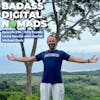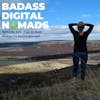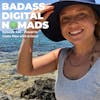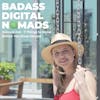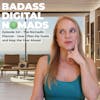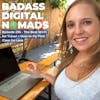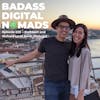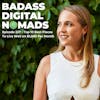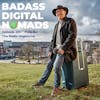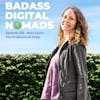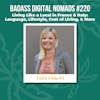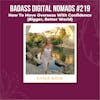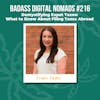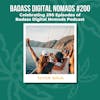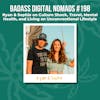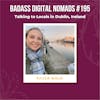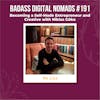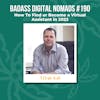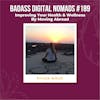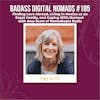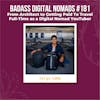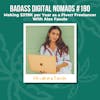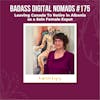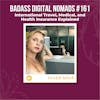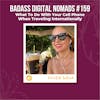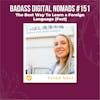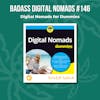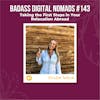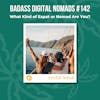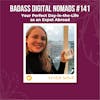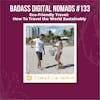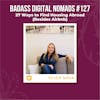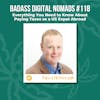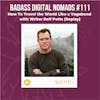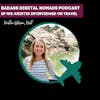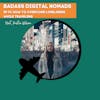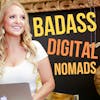How to Become a Minimalist Digital Nomad
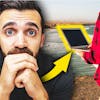
The mainstream perceives a minimalist lifestyle as "extreme" - but is it? Today's podcast explores how the conscious choice to own as little as possible can be the ultimate path to freedom. Learn how to overcome the three main blocks to becoming a minimalist digital nomad and five tips for more freedom in 2021.
The mainstream perceives a minimalist lifestyle as "extreme" - but is it? Today's podcast explores how the conscious choice to own as little as possible can be the ultimate path to freedom.
Learn how to overcome the three main blocks to becoming a minimalist digital nomad: (1) the decision to sell your stuff and let go of some material possessions, (2) the logistics of what to do with your stuff, and (3) what it means for your future life plan.
Bonus: At the end of this episode, get five tips on becoming more of a minimalist in 2021 to make room for a life of more freedom and travel.
EPISODE HIGHLIGHTS:
- What is a minimalist?
- What is the difference between a minimalist and an extreme minimalist?
- What are the benefits of adopting a minimalist lifestyle?
- How do you become a minimalist?
- 5 tips for becoming more minimalist in 2021
QUOTES:
- Cal Newport: “Being unreasonable is a reasonably good way to make your life more interesting.”
- Robert Greene: “The time you are alive is the only real possession you have. Everything else can be taken away from you. You can give it away or you can make it your own. You can make each moment count.”
- James Clear: "You do not rise to the level of your goals. You fall to the level of your systems."
SHOW NOTES & RESOURCES:
- Videos:
- Resources:
Two things all digital nomads, remote workers, and world travelers need:
SHOUT OUTS:
Thank you to my 2020 Patrons! Teklordz, Trader Walt, Shawn, Karen, Christine, Erik, Heather, Colin, Craig, RZ, Timothy, James, Richard, Fred, Lakshay, Ervin, Susan, Margaret, Larry, Zhivko, and Darren.
You can become a Patron for $5/month at Patreon.com/travelingwithkristin and see all my YouTube videos first, attend monthly live streams, submit questions for the podcast, and be the first to find out about special offers and guests, as well as the chance to participate in beta programs at free or discounted rates.
.......................................................................................................
Support the Badass Digital Nomads Podcast:
- Become a Patron for $5 per month
- Leave a 5* Review: https://lovethepodcast.com/digitalnomad
- Buy Official Merch
- More Info: www.badassdigitalnomads.com
Connect with Kristin on Social Media:
- Follow on Instagram
- Subscribe to Traveling with Kristin on YouTube
- Subscribe to Digital Nomad TV on YouTube
- Join the Badass Digital Nomads Facebook Group
Podcast descriptions may contain affiliate links of products and services we use and recommend at no additional cost to you.
Introduction: Welcome to Badass Digital Nomads, where we're pushing the boundaries of remote work and travel, all while staying grounded with a little bit of old school philosophy, self-development, and business advice from our guests.
Kristin: 00:00:22 Hi there, Kristin, from Traveling With Kristin here, and welcome to episode 87 of Badass Digital Nomads, and a very Merry Christmas and Happy Holidays and Happy New Year and all that great stuff to you. As today or this week is the last week of 2020. Where does the time go? <laugh> I'm sure this has been a really weird year for everyone, and it kind of feels like it went by very slowly, but also in a blur, so it's been weird. I don't really need to expound upon that. But today's episode is a solo cast about how to become a minimalist digital nomad and what that even means. Anyway, <laugh>. But first, I am so blown away by the response to the free digital nomad strategy calls that I announced on last week's solo cast. They filled up within, I think an hour or so of the podcast going live with one listener telling me that she pulled over on the side of the road to book the call before listening to the rest of the episode.
Kristin: 00:01:43 So that is amazing. It's been so great to connect with you one-on-one and hear your questions, your curiosities, your concerns about travel and online business, and kind of where you're thinking about your future and the digital nomad lifestyle, and especially going into the new year. So I've decided to add more availability for January, and if you have checked the schedule as of listening to this episode and it's still full, then just send an email to hello@TravelingwithKristin.com and we will do our best to fit you in. So those free calls, again, you can access the link, the Calendly link to book in the show notes, or go to TravelingWithKristin.com/freecall to apply. Since this is the last episode of the year, I also wanna give a big shout out and thank you to all of my patrons of 2020 over at patreon.com/TravelingWithKristin.
Kristin: 00:02:56 So thank you to Teklordz, to Trader Walt, Shawn, Karen, Christine, Erik, Heather, Colin, Craig, RZ, Timothy, James, Richard, Fred, Lakshay, Ervin, Susan, Margaret, Larry, Zhivko, and Darren. Thank you guys so much for your support this year, and it's been so great to get to know you better, and you too can become a Patreon for just $5 per month over at patreon.com/TravelingWithKristin. And you'll get to see all of my YouTube videos first, attend monthly live stream Q&As, submit questions for the podcast, and you'll be the first to find out about special offers and podcast guests as well as have the chance to participate in my courses and beta programs for free or at discounted rates. So I think that's all the announcements for today, and onto today's episode. So again, this episode is about digital nomad minimalism, and it was inspired by a video that I saw on YouTube by YouTube's favorite minimalist, Matt D'Avella a couple weeks ago.
Kristin: 00:04:23 He has published two videos in recent weeks on this topic. So one is about him selling all of his stuff and booking a one-way ticket, get to Australia. And then the other one was filmed from Sydney from the hotel where he's quarantining with his wife Natalie. And that one is about why they left California in the first place. So I'll link to those videos in the show notes if you haven't come across them or if you have no idea who I'm talking about. But I also made a, basically like a reaction video called Dear Matt D'Avella Advice on Becoming a Minimalist Digital Nomad, where I address their fears and concerns, and anxieties on making such a big move like that. And the reason I made that video and the reason why I'm making this podcast is because I realized that everything that they were saying and expressing in their videos was just so reminiscent of the same things that people talk to me about in my private strategy calls or in relocation planning, in private messages on Facebook and in Instagram and things like that.
Kristin: 00:05:44 So I thought instead of commenting on his video or sending an email with some tips, I thought the best way to help would be to create a video and a podcast addressing these things, because suffice to say, everyone has kind of the same concerns and the same struggles when it comes to making a big life change or a decision, especially to sell everything in book a one way ticket to another country, or even if you just want to, um, free yourself up from stuff and material things that have been weighing you down. You don't have to necessarily want to sell everything, move abroad, and become nomadic. But I think that everybody would benefit by taking a pragmatic, minimalist edit, so to say to your life. Because if you're not intentional about cutting away the things that are not essential in your life, it's just the pattern of nature that things are going to accumulate.
Kristin: 00:06:57 So sometimes you gotta clean house, do a little spring cleaning or winter cleaning in this case, or depending on when you're listening to this episode. But yeah, I just wanted to help ease your fears. And so I made that video and I just wanted to get into a little bit more, uh, detail and more philosophy here on the podcast and riff on the concept of what it means to be a minimalist digital nomad and just provide a little bit more context and perspective. So I'll link to those three videos in the show notes. And just seconds before I hit record on this podcast, I just got a notification of a comment by Matt D'Avella on my video, whoa, <laugh>. So I guess I tweeted to him this morning and his wife that I made this video for them, but I was going to email them and I haven't even emailed them yet.
Kristin: 00:07:54 So he, I'll read you his comment. He says, ah, thanks so much for making this Kristin happy face. It was really nice to hear your perspective on the nomad lifestyle, and I've definitely made the switch to full on excitement since the craziness of the move has settled down. So I wrote, you're so welcome and glad you guys arrived. Safe and sound, and that I'm excited to follow along on their journey and this new chapter in life and see where their travels abroad take them. So that's super cool that he actually watched the video, that's why I made it. But also for everyone else, because if you're going to help one person, there's likely a handful, if not hundreds or thousands or millions of people that are feeling the same anxieties and insecurities. So here we are. But just to summarize, there were three main points of concern in Matt's initial video about selling everything.
Kristin: 00:08:57 And well, the first point was the difficulty of the decision to sell everything. And then the second point was, okay, once you've made that decision, what do you do with all of your stuff? And kind of the stress of dealing with that. And then the third thing is kind of more meta, and it is the bigger picture of what this type of decision means for your future life plan because this is a massive disruption to the status quo. So I'll go through each of those points and kind of give my perspective in hindsight from not just having gotten rid of all of my stuff way back when, when I started traveling in the early 2000s, but also from the perspective of being a minimalist by default, just by virtue of being nomadic or by living in foreign countries and not knowing how long I would be staying there.
Kristin: 00:10:08 And kind of, in hindsight, what it's like from this side to not have accumulated a lot of stuff in the first place. So the first thing is this decision to sell everything and go nomadic, and the stress of making that decision. And I found this particularly intriguing because Matt D'Avella is famous for being a minimalist and having a minimalist YouTube channel. And he even made a documentary on minimalism. He has interviewed other minimalists on his podcast, I don't know if he still has it, but when he did have a podcast, and yet here he was at the end of 2020 making a video about his struggle with the decision to basically become a more extreme minimalist and get rid of all of his stuff and why, you know? So to figure this out and understand it better, we have to first look at the definition of minimalism because this isn't even a thing that always existed.
Kristin: 00:11:17 This is just a movement that has come about from this culture of consumption that we live in in modern day society. So I googled it <laugh>, and on larseneriksen.com, it says, minimalism is about avoiding the unnecessary, it's about simplicity, utility, and elegance. It's about less is more in terms of embracing the most of fewer things. So minimalism can be construed with being boring in a way or being extreme about stuff. And everyone has their own sliding scale or definition of what they're, you know, what is the line that you wanna draw in the sand? Where does minimalism go from being practical to being extreme and to kind of negating the what life is about as far as the fun and the experience and the randomness of life? And so I'm looking at as more of just something to apply with moderation to the extent that it makes sense for you.
Kristin: 00:12:36 Because what location, independence and lifestyle design and minimalism are all about is living life on your own terms. And no one can tell you what's going to make you happy or what you should own or what you should sell. That is up to you. So that is the good news. But now there's this concept of extreme minimalism, which is a conscious choice to own as little as possible. And the example I found is having no furniture is a part of extreme minimalism. And I thought that was interesting because I don't own any furniture, but it doesn't seem extreme because I also don't live in a house that I own, like I own houses as investment properties, but I don't own a house full of furniture that I live in. So maybe if you had a house that you owned or that you rented long term that you just kept with no furniture in it, maybe that would appear extreme.
Kristin: 00:13:40 But when you live where you are or you live out of suitcases or a backpack, then maybe not owning furniture is just, it's not extreme. It's like understood that of course you wouldn't own furniture if you're living in a furnished house in Thailand, for example. So even the concept of extreme minimalism is subjective <laugh>, because it depends on what your situation is. And with Matt and his wife Nat, they lived a minimalist lifestyle, or at least he did. I don't know if she was like fully identified as being a minimalist, but yet we see this push and pull and like anxiety over getting rid of even a very minimal amount of stuff compared to some other people. So in the video, I also talk about why it's difficult to shed all of our stuff. And I liken it to cutting your hair because getting rid of your stuff or your hair or changing your appearance, or having like a full extreme makeover, it messes with your sense of self and your identity.
Kristin: 00:14:54 And even though we come into the world with nothing and we leave with nothing during that middle part of life, we begin to fully identify with what we do for a living and what we have, and we start to understand who we are as a reflection of our surroundings. So that can be a reflection of the society and the country and the culture that we live in. But it can also be the car you drive, the clothes you wear, what your house looks like, how big it is, how nice it is, what city you live in. Like there's so many different things that make up our sense of self. And not all of it is real <laugh>. Some of it is just a mirage and some of it is a mirror, and some of it clouds who we really are when we are. You know, a lot of people say that they want to travel to be able to find themselves, and it's like you're always gonna be you.
Kristin: 00:15:59 And it's just that getting out of the context of your day-to-day environment can give you some distance, some perspective, and just some space to figure out who you are, what you like without having a lot of distractions. So getting rid of everything feels foreign because it's hard to imagine who you are without stuff that you own. And so this becomes an uncomfortable concept, and an obstacle is the way type of way. If you've read that book by Ryan Holiday, The Obstacle Is the Way Book. So this obstacle of owning stuff becomes the path that you must walk to actually find yourself. So it's like to figure out who you are, you must get rid of some of the stuff that's weighing you down or some of the stuff that's distracting you from what you perceive to be your true purpose in life, or that's kind of in the way between you and any adventure that you want to have or life experience that you want to have.
Kristin: 00:17:11 So it helps to think about who you might be outside of the context of your hometown, your habits, and your material things, or, in other words, who are you when you're outside of your comfort zone. And so it's worth sitting with this question to see what comes up if you're not in the situation that Matt is in, where you're gonna get the answer to that because you literally sold everything, got on a plane and flew halfway across the world. So this decision to sell everything can be controversial, it can be uncomfortable, and the concept of minimalism can seem extreme to some people, but that is only as a reflection of the society of modern day capitalism and consumerism and access to all of the comforts that we have today. So it wouldn't have even been this way a hundred years ago or during the Great Depression, when people didn't have the problem of having too much stuff or too much opportunity.
Kristin: 00:18:24 They didn't have enough, they didn't have enough to eat, they didn't have enough to be comfortable. And so now it's all about moderation, you know, indulging when appropriate, but like also being able to maintain your physical and mental health in a society where everything is available 24/7, including things that aren't good for you or aren't healthy for you. So my perspective is that even though accumulating stuff, whether it's material things or a status or a job title or car or whatever, or just money, doesn't result in happiness, the path of least resistance is to try anyway <laugh>, because that's what we've been taught and that's what everyone else is doing. So maybe we think subconsciously, okay, it didn't work for these people, but maybe it will work for me, maybe if I have all of this money or all of this stuff, that I will be happy even though these other people aren't happy.
Kristin: 00:19:33 You know, people who are listening to this podcast like we are all on the maybe the fringes of mainstream society in a way because we are open to an alternative way of living and we are searching for something beyond what the status quo and what the average lifestyle provides. And I'm always seeking to push that edge and to get outside of my comfort zone as well. And so in addition to creating, I'm also consuming through books, through a podcast, through videos. I mean, that's how I got the idea for this was through watching someone else's YouTube videos. And I recently listened to an episode of Johnny FD's Travel Like A Boss podcast with Charles Ngo, Charles, Ngo. And he said something that I saved in my Apple Notes. He said, to get different results, you have to do what everyone else isn't doing. So that really resonated with me.
Kristin: 00:20:44 Like Charles was saying, okay, you know, if you want a different result, you can't take that normal nine to five job, you have to create your own job or create a company. And if everyone is getting less than six or seven hours of sleep per night, then I'm going to get eight or nine. And so he's specifically looking for ways that he can do what everyone else is not doing. Like, and I know people like Gary V and others say this as well, they're like, well, if everybody is out partying or whatever every weekend, then I'm not gonna do that. I'm gonna work on my business on the weekend and you know, whatever that looks like to you. And so whereas Matt and Nat were struggling to justify their idea and desire to sell everything and move to another country during a pandemic because so few other people were doing, I thought it was really admirable that they decided to follow their logic and their intuition anyway and move to Australia to be closer to friends and family, even though it was stressful.
Kristin: 00:22:02 And even though it seemed weird to their friends, or even though it seemed risky, and even though it meant leaving the comfort of their home in southern California that they loved. And that was very lovely <laugh>. One of the articles that I cited in my video was an Atlantic article that talks about how research has shown that experiences bring people more happiness than possessions. And one of the researchers and psychologists in that article was a Harvard psychologist named Matthew Killingsworth, and he said, quote, nothing material is intrinsically valuable except in whatever promise of happiness it carries. End quote. So when we are buying things or attributing happiness to something material, it's not that item that is valuable, it's the idea that that item represents. That's the sentimentality that comes from, um, material things. So you may have seen before on social media or in the news stories about how experiences provide more fulfillment than things.
Kristin: 00:23:29 And this is true, you know, instead of buying a new car, you could go on a really memorable trip with your friends or family. Instead of buying a designer purse, you could buy concert tickets and go enjoy music with your friends. Instead of buying a movie at home, you could go see a play and have like a different experience. So basically, when you sell more of your stuff or give up your home and give yourself more room to either travel more or to move to a new place, you are essentially opening up the potential for increased happiness and satisfaction in your life in the form of experiences rather than stuff. So it's like, as you're listening to this podcast and as you are looking at your life situation and editing your life, you wanna think about not necessarily selling everything and becoming a nomad, but where can you decrease the expenditure or the presence of material stuff in your life, and where can you replace that with experiences?
Kristin: 00:24:50 So that is some food for thought. So when it comes to becoming a minimalist or becoming a digital nomad, or both, that decision is the hardest part. So if you, you can make it through the decision and the resistance and the pressure of maintaining the status quo, you can be on your way to a lighter and freer and simpler and more fulfilling life. And I think that's really the message that I have with that. Now the second issue is more logistical and practical, and that is what to do with all of your stuff, <laugh>. And so in much of this video with Matt and his wife, they are talking about the pain of letting go of things that sentimental value that we just talked about, and also the stress of getting rid of everything on a timeline because they had this countdown to the day that they had to be at the airport and boarding the plane for Australia.
Kristin: 00:25:55 And so this part is something like more practical that you can do, whether or not you are becoming a digital nomad and the end of the year, beginning of a new year, is a really good time to go through this exercise that I'm going to share with you. So, in planning relocations for people over the past nine years, there's really four options that I give them for what they can do with their stuff. So you can either sell your stuff, you can donate it, you can throw it away, or you can store it. So four things, sell it, trash it, donate it, store it. And we see in this video, Matt, going through this process actually by either selling stuff on Craigslist or throwing it away or deciding how he's gonna downsize or if he's gonna put it in storage, leave it with a friend, et cetera, et cetera.
Kristin: 00:26:56 So this is something that you can do today, <laugh>, after you listen to this podcast, even if you're not planning on going anywhere, you can actually go through your house and designate what to do with each thing. And a good rule of thumb is if you haven't touched it or used it or looked for it in the past year, you can probably get rid of it. And then at the end, I'll give you four tips for other things that you can do to become a minimalist. But this is a really big one, is just lessening and lightening your load and getting rid of your stuff. And then the third main point that they talk about in this video is what this decision to sell everything and move means for their future. As in what does this type of decision mean for your life's plan as an adult?
Kristin: 00:27:58 If you choose to go on this path of either minimalism or nomadism or full-time travel and you eshoo these, you know, labels and status symbols and modern day comforts and material stuff, like are you in some way ruining your life, <laugh>? Are you stopping or reversing progress that you've made over however many years of your adulthood? Or are you in some way losing momentum on the linear path to success as an adult in modern day society? And so we'll, we see in the video Matt and Matt sitting on the bed and just talking about how it's even possible to plan for the future if you don't live anywhere. And this is especially poignant if you are in a relationship and you're talking about, you know, buying a house, getting a dog, having kids, that sort of thing. Like how to have a family if you don't live anywhere, and are you postponing these big, uh, life accomplishments, or I guess, milestones.
Kristin: 00:29:20 But I would like to just say, what if you could do both? Um, what if you could make a new plan that involves this new country or this new home, or this new way of living? And what if, you know, we've always heard these sayings that life is what happens while we're making other plans. But what if it's true? What if, uh, our plans are just a jumping off point for something better that life has in store for us? And what if life is more creative than we are? I mean, that's likely <laugh>. So it's also good to think about, you know, what if our plan isn't fully comprehensive and that there's more to it, and what if we kept that door open and what if we put our plan on a temporary pause and saw what else could happen and then maybe came back to it?
Kristin: 00:30:19 I mean, that's always something that you can kind of always come back to the media, and you can always come back to the status quo, but you won't always have the opportunity to pursue a big dream that you've had your whole life. And so I think that they made the right decision, and that's always something that I've lived by personally, by thinking, okay, if it doesn't work out, if I run out of money, or if something happens, I can always move back and apply for a regular nine-to-five job. But it's never had to come to that. So it's also worth asking, we know when thinking about if you sell your stuff or move, are you, you know, losing your position or losing your status or losing progress? And it's worth asking if that life plan that you're on now, if that is actually your ideal plan, like, where did your life plan originate?
Kristin: 00:31:20 Did it come from you? Did it come from your soul? Or did it come from an idea that was held by someone else, whether it was your parents or your teachers, or society? And if you could start over, what would your plan look like? Like, what if you started a new plan from a new place that wasn't influenced by things that you didn't necessarily care about? So maybe is there a plan that you have for your life that you haven't acted on because you thought it was too unrealistic or unacceptable? And so what I found after moving a thousand people, or more than a thousand people, to 35 different countries, is that if you are dissatisfied with your current life situation, then there's likely a new or better, or different plan out there waiting for you if you pursue it. You don't have to accept your current situation as permanent.
Kristin: 00:32:42 And I heard a really good quote by one of my favorite authors, Cal Newport on the Daily Stoic podcast recently, and he said that being unreasonable is a reasonably good way to make your life more interesting. And I think that that really fits with this conversation because being a digital nomad or being able to live anywhere or in multiple places or becoming a extreme minimalist, these are like unreasonable things when you look at the median status quo. But they are good ways to make your life more interesting. And another famous writer, who is Ryan Holiday's mentor, Robert Green, also said on the Daily Stoic Podcast that time is the only real possession that you have, the time that you are alive, like everything else can be taken away from you. He says you can give it away or you can make it your own, but it's up to you to make each moment count.
Kristin: 00:33:55 So if we think about it, you know, we can't take our material possessions with us. We can only experience things in the present moment, and we only own the time that we have today, right now, while we are alive. So what if we started looking at life from that perspective as a limited commodity that, you know, we only have today, so we can learn from the past, we can plan for the future, but let's keep it in context of what we control, and we only control what we're doing now in this moment. So those are the three main aspects of this video. The number one, the difficulty of making the decision to sell everything or move or go nomadic. The second thing is what to do with all of your stuff once you make that decision. And the third thing is how to reconcile what this big, scary decision means for your future.
Kristin: 00:35:15 And so if any of this appeals to you, I have a few steps that I came up with that you can take action on now during the time that you have now to become more of a minimalist and to simplify your life and to just feel less stressful, um, less stressed out, more zen and lighter and freer, regardless of where you're living right now, regardless of whether you are traveling or plan to travel, regardless of if you have kids or not, or you're single or whatever your plans are, it's likely that everyone will benefit from bringing a minimalist perspective in and editing your life a little bit to just take some stuff off of your proverbial plate. So I have five tips. The first thing is to stop buying things. <laugh>. And this is tough because this year that I've been living in the US, I found myself buying more stuff on Amazon, like I didn't even have an Amazon account before, and now I'm like, oh, I need that and just click buy it, one click.
Kristin: 00:36:33 And um, the writer James Clear says that people don't rise to the level of their goals, but they fall to the level of their systems. So rather than using sheer willpower or determination or relying on your memory to like stop buying things, you need to create a new habit of non-consumption. And it will help to create a system that makes it harder for you to buy stuff. So that puts some sort of friction or some sort of resistance between you and the habit of consumption. So, like in my case, and in many people's cases, that can mean turning off one click on Amazon or removing your credit card, or even deleting your account, putting some sort of step there so that when you go to like knee-jerk purchase something, maybe you have your credit card info saved in your Google Chrome or your Safari, it's not there.
Kristin: 00:37:29 So you have to actually pull out your credit card to buy it. Or that could mean taking it out of your like Uber Eats account or your DoorDash, you know, anything that you think that you're spending too much money on, what can you put as a piece of friction in between that automatic habit or routine that you have? So when you get the urge to buy something, ask yourself, would I need this if I were a digital nomad? Or would I need this if I were living my best life in Portugal? Like, what I buy this, what am I gonna use it for? So just something to think about. First things first and becoming a minimalist is to stop accumulating more stuff. The second thing is to get rid of stuff that you don't use that does not bring you joy. It doesn't mean just sit in an empty house with only a desk and a chair and one fork and one spoon.
Kristin: 00:38:32 It just means to shed stuff that you don't use. And before buying more stuff, use what you have. So sell, donate, or throw away whatever you don't use. And it could also be simple stuff, like I just moved from one Airbnb to another and I realized how much stuff I just had in my pantry, and I'm like, holy crap, I don't want to carry boxes of like food <laugh> like pasta and canned food over to the new house. So it could be as simple as like eating whatever's in your pantry and making creative meals out of it before you go to the store and like fill up more stuff. Just kind of being more cognizant of these automatic habits and activities, and responses that you have throughout the day. And a third important thing that you can do to adopt a more minimalist mindset and prepare yourself for a future that includes either full-time travel or more travel, is to comb through your budget and cut out anything that doesn't spark joy.
Kristin: 00:39:44 To quote Marie Kondo, cut out anything that's not essential to take a more stoic, philosophical perspective on it. But there's usually a lot of waste in all of our budgets, and this accumulates organically. So you have to act like a business and cut costs because they're just going to add up if you're not careful. And if you do this now, then you'll be more prepared when it does come time to travel, and chances are you're gonna end up saving a lot more money over the upcoming year on stuff that you don't use. Um, I forgot where I heard this, but someone said that any automated subscription that you have an automated expense is someone else's passive income. So if passive income is something that you want, it helps to first cut any passive expenses that you're not using. So that can, um, also help on your, uh, journey of location independence or just to create a separate savings account for travel that you can use in the future without really increasing your amount of pain and suffering today.
Kristin: 00:41:03 And then the fourth thing that could be kind of a fun exercise in brainstorming where you might be traveling to next, is to pack a bag, just like pack a suitcase and pretend like you're going somewhere and think, what would you take with you? Like if you were gonna go on and around the world trip for a year, what would you need? And then pack it in a bag, and then see what's left over and what are you gonna do with the rest of that stuff. And if you wanna be even more extreme, you can pack that bag and then take out half of it <laugh>, because that is a good rule of thumb for packing because typically you don't use everything that you pack to bring with you. If you want, um, a digital nomad budget and a packing list, I will leave the links to mine in the, uh, show notes so you can download those for free.
Kristin: 00:42:02 And then my fifth tip is really about becoming a digital nomad is not so much about what pack and bring with you, it's about what you don't bring. And so I do have a digital nomad minimalist gear set up on in my Amazon store, so you can go to amazon.com/shop/TravelingWithKristin to see all of the digital nomad minimalist gear I use, like this is the bare minimum of what I need to travel and work remotely. And you can also go to TravelingWithKristin.com/amazon and that will take you to my Amazon store. So everything in that store, those are like books that I recommend, travel gear, and accessories that I use. But first and foremost, like my remote office stuff, and it's been interesting on this podcast when I ask other people what their best remote work tools are, and it seems like a lot of the people I interview are also minimalists because really like the only things they need is like their phone, their laptop, their noise canceling headphones, and their Wi-Fi devices.
Kristin: 00:43:18 So there's not that much, uh, that you need. So give, give a look around your house and anything that is you're not using and that's not bringing you joy and that you can't take with you. If you were to travel or move to another country or become a digital nomad, then consider, uh, what can you do with it? So to me, being a minimalist is the epitome of living life on your own terms because it's only about consuming and participating in things that make you happy. So if a luxury car or designer handbag, or nice clothing makes you happy, then by all means go buy them. But don't fall for the idea that having more of everything or a certain job title or the newest, you know, flat screen TV or endless amounts of money, or some status in society is going to generate true fulfillment, because that's a facade.
Kristin: 00:44:29 And if money and material things resulted in happiness and fulfillment, then all celebrities and trust fund kids would be happy. People who retired early would be happy. We've had people who retired early on this podcast who didn't just quit working. They found new things to do, you know, because that's not working. And just living off passive income is not gonna make you happy either. So becoming a minimalist isn't some kind of magic bullet that's gonna solve all of your problems, but it can help you feel that much freer and less stressed and bring more of your personal focus and attention to the one or five or 10 or 20% of activities and people and things, material things in life that bring you 90% of your happiness. And doing a little minimalist edit of your apartment or your life or your budget can help you start the new year with a clean slate.
Kristin: 00:45:43 And I hope that is what it helps you do. So if you found value in this or other episodes of Badass Digital Nomads podcast, please share the wealth, share them with a friend or on social media, and, uh, pay it forward. Leave a review wherever you listen, and I'd be interested in hearing your take on the minimalist lifestyle. Um, so come on over to the Badass Digital Nomads Facebook group. Let's start the discussion and to watch all of the videos that I talked about in this episode. Check the show notes or head over to youtube.com/TravelingWithKristin to watch My Dear Matt D'Avella reaction video. So I hope you all have a very Happy New Year and see you next week in 2021. Stay badass. Thank you so much for listening. And remember to leave a review for the podcast wherever you listen and share this episode with someone you think it might help.
Kristin: 00:46:57 And to further support the podcast, plus get tons of access to exclusive behind the scenes content. Consider becoming a Patreon patron for just $5 per month. You can enjoy early access to preview my YouTube videos. Get exclusive patron only posts and personal updates that I only share on Patreon. Join my private monthly live streams and live Q&As and get behind the scenes access to private, unlisted live podcast interviews or Zoom video recordings that are only available to my patron. You also get the ability to vote on upcoming videos and podcast guests and can submit your questions for our guests directly. You'll also get discounts on merch and swag and many more surprises on deck throughout the year. And again, you can become a patron for just $5 a month at patreon.com/TravelingWithKristin. That's P-A-T-R-O-N.com/TravelingWithKristin; K-R-I-S-T-I-N. And thank you for your support.
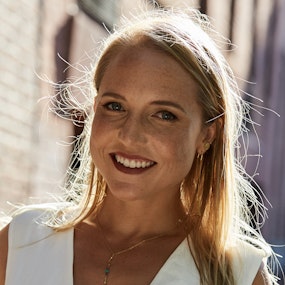
Kristin Wilson
Host of Badass Digital Nomads & YouTube's Traveling with Kristin / Author of Digital Nomads for Dummies
Kristin Wilson is a long-term digital nomad and location-independent entrepreneur who has lived and worked across 60 countries in 20 years. Since founding a fully-remote, international relocation company in 2011, she has helped more than 1,000 people retire or live abroad in 35 countries. Today, she helps aspiring remote workers, digital nomads, and expats achieve their lifestyle goals through her YouTube channel (Traveling with Kristin) and podcast, Badass Digital Nomads.
Kristin is the author of Digital Nomads for Dummies. She's also a Top Writer on Medium and Quora in the topics of business, travel, technology, life, productivity, digital nomads, and location independence. She has been featured on The Today Show, Bloomberg Businessweek, Business Insider, ESPN, The New York Times, WSJ, Huffpost, HGTV’s House Hunters International, and more.


























